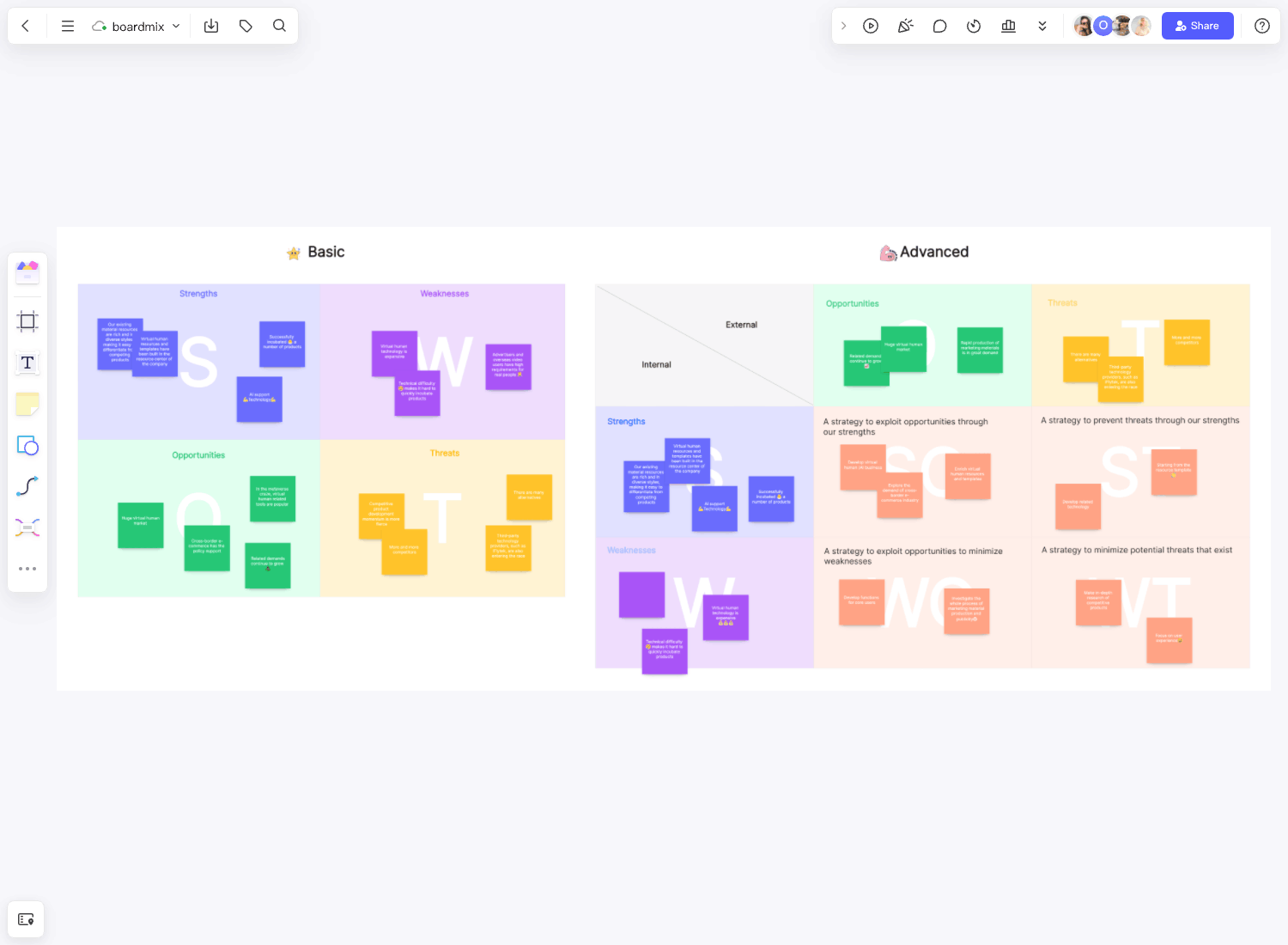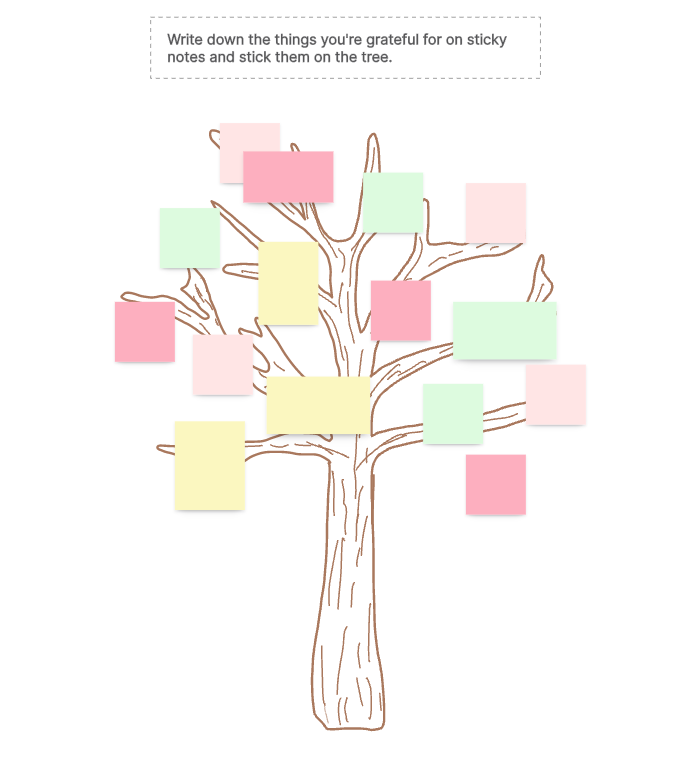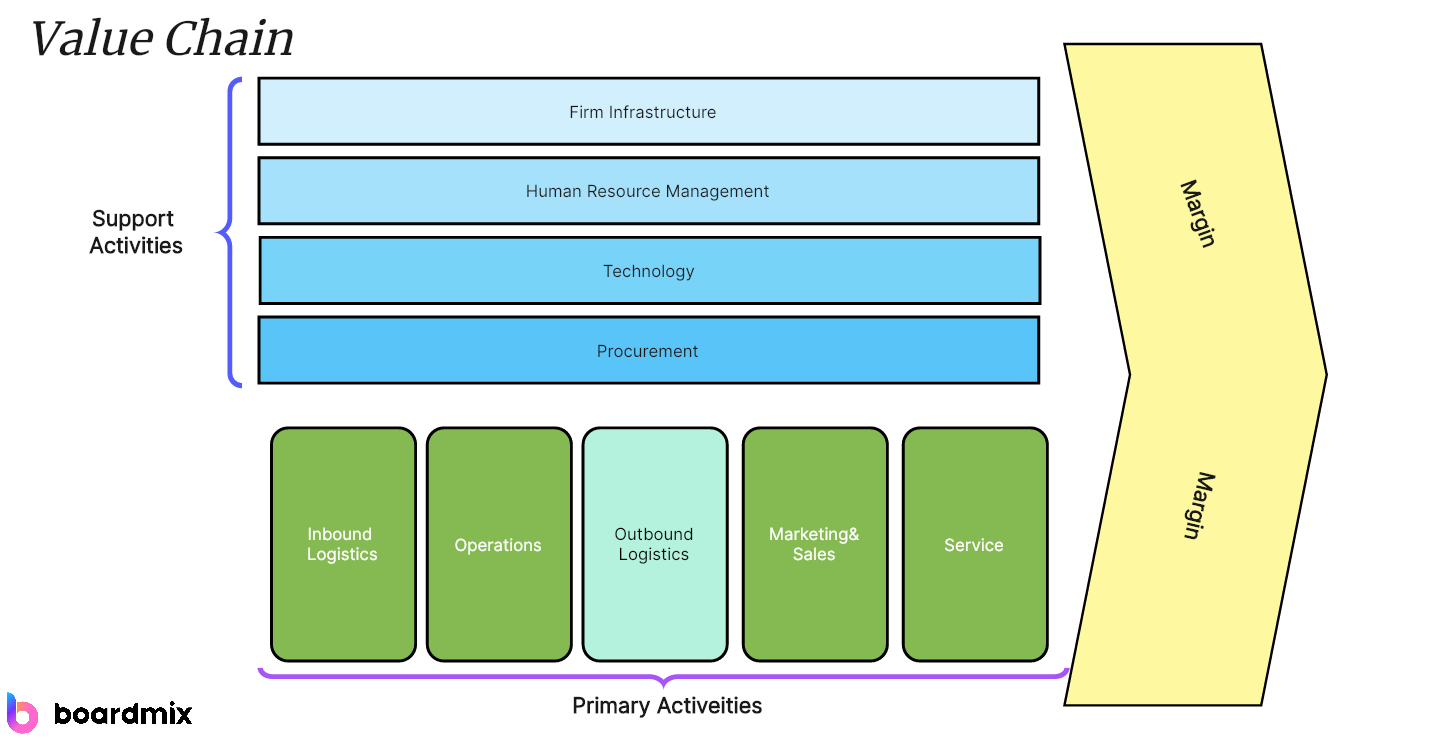In today's fast-paced digital world, effective team collaboration is paramount. One of the best ways to enhance teamwork is through the use of retrospective tools. These tools offer a platform where teams can reflect on their work, identify areas of improvement, and plan for future success. Let's delve into what these tools are and explore some of the best options available in 2024.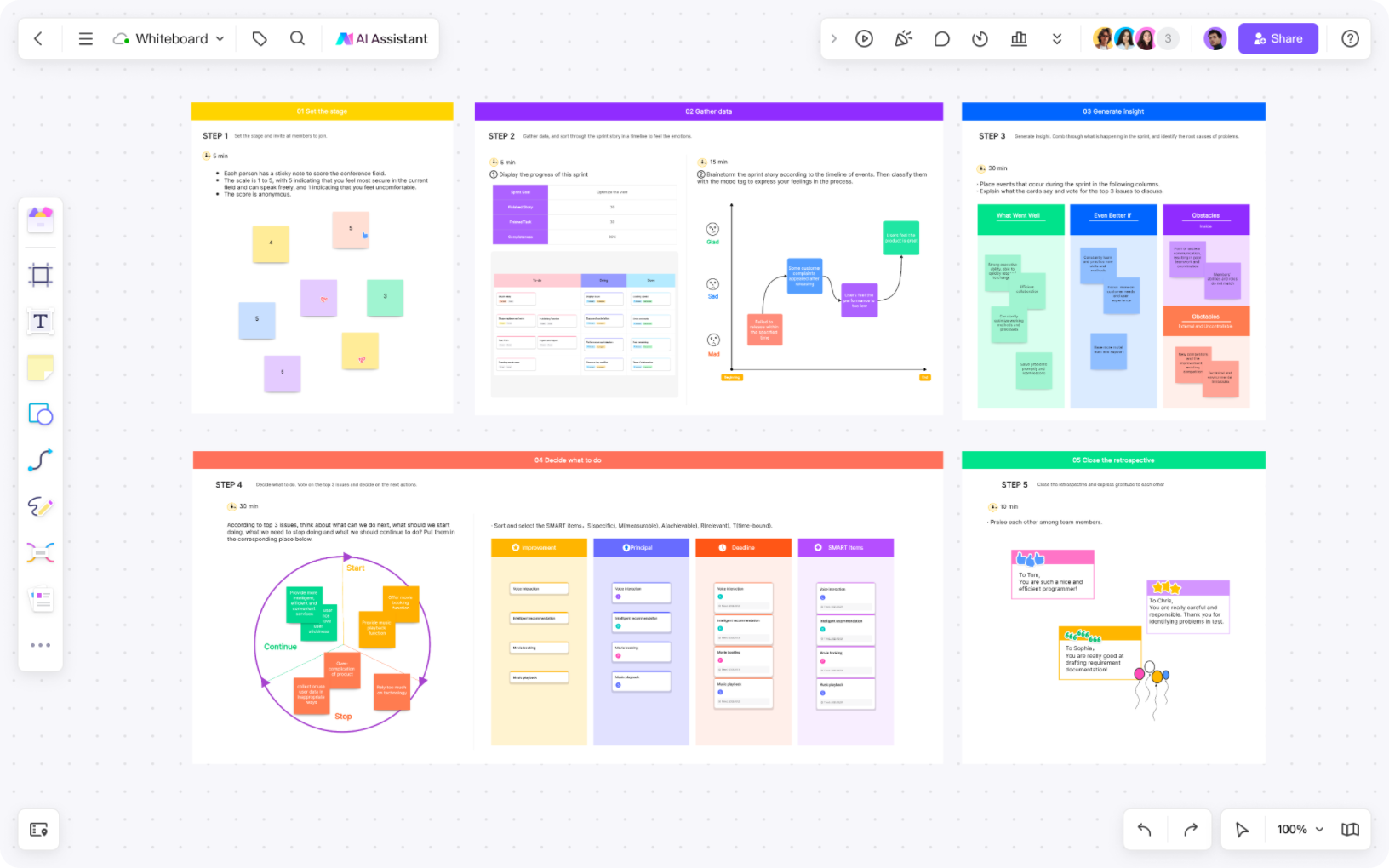
Part 1. What are retrospective tools?
Retrospective tools are specialized software applications that are specifically designed to facilitate post-project reviews, also known as retrospectives, within teams. These tools provide an interactive and collaborative platform where team members can openly share their thoughts, feedback, ideas, and experiences after the completion of a project or sprint. They serve as a digital space for reflection and discussion, encouraging teams to identify what worked well, what didn't, and how they can improve in future endeavors. By fostering open communication and continuous learning, these tools play a crucial role in enhancing team performance and productivity.
Part 2. Must-have features of retrospective tools
When selecting a retrospective tool for your team, there are several critical features that you should take into account to ensure it meets your specific needs:
- User-friendly Interface: The tool should have an intuitive and easy-to-navigate interface. This is crucial as it ensures that even those who are not tech-savvy can use the tool effectively without needing extensive training or support.
- Real-time Collaboration: The tool should support real-time collaboration. This means it should allow multiple users to work together simultaneously on the same platform, making changes and updates that are visible to everyone in real time. This feature fosters immediate feedback and enhances teamwork.
- Customizable Templates: The tool should offer a variety of customizable templates. These templates can be tailored to cater to different project needs, making the retrospectives more structured and efficient. They also save time as teams don't have to start from scratch every time they conduct a retrospective.
- Integration Capabilities: A good retrospective tool should have the ability to integrate seamlessly with other project management or communication tools that your team uses regularly. This feature allows for streamlined workflows and improved efficiency as teams can access all necessary information and tools from one central location.
- Security Features: Lastly, but certainly not least, ensure the tool has robust security measures in place to protect your data. This includes features like end-to-end encryption, two-factor authentication, and compliance with data protection regulations. Data security is paramount in today's digital age where cyber threats are prevalent.
By considering these key features when choosing a retrospective tool, you can ensure you select a solution that not only facilitates effective retrospectives but also enhances overall team collaboration and productivity.
Part 3. 10 Top Picks for Retrospective Tools in 2024
Let's now delve deeper and meticulously examine some of the most highly recommended and top-tier retrospective tools that are expected to dominate the market in 2024. These tools, with their advanced features and robust capabilities, are poised to redefine team collaboration and retrospectives in the near future.
1. Boardmix
Boardmix is a cutting-edge online whiteboard tool that stands out with its vast array of drawing templates, making it an ideal choice for conducting efficient and effective retrospectives. Its user-friendly interface, designed with simplicity and ease-of-use in mind, makes it highly accessible even for beginners who may not be tech-savvy. Furthermore, Boardmix takes team collaboration to the next level with its real-time collaboration feature. This allows multiple users to work together simultaneously on the same platform, fostering immediate feedback and enhancing teamwork dynamics. With these features, Boardmix not only simplifies retrospectives but also promotes a culture of open communication and continuous learning within teams.
Here are some key features of Boardmix:
- User-friendly Interface: Boardmix boasts an intuitive and easy-to-navigate interface, making it accessible even for beginners who may not be tech-savvy.
- Real-time Collaboration: With Boardmix, multiple users can collaborate in real time, enabling immediate feedback and fostering enhanced teamwork.
- Extensive Drawing Templates: One of the standout features of Boardmix is its wide array of drawing templates which are perfect for retrospectives, offering teams flexibility and variety in their discussions.
- Robust Security Measures: Boardmix takes data security seriously, implementing robust measures to ensure your team's information remains protected.
- High Customizability: The platform allows for high customization, enabling teams to tailor the workspace according to their specific project needs.
- Seamless Performance: Despite its extensive features, Boardmix maintains seamless performance ensuring smooth operation without lags or glitches.
Pros:
Real-time collaboration enhances teamwork.
Extensive range of drawing templates provides flexibility.
Robust security measures protect user data.
High customizability caters to different project needs.
Cons:
Lack of integration capabilities with other project management tools might limit its functionality.
Ratings: 4.8/5
2. Sprint Boards
Sprint Boards is a dedicated retrospective tool designed to streamline team feedback and collaboration. It boasts customizable templates, real-time updates, and seamless integration with popular project management tools. However, its user interface may present a learning curve for beginners, potentially impacting initial ease-of-use.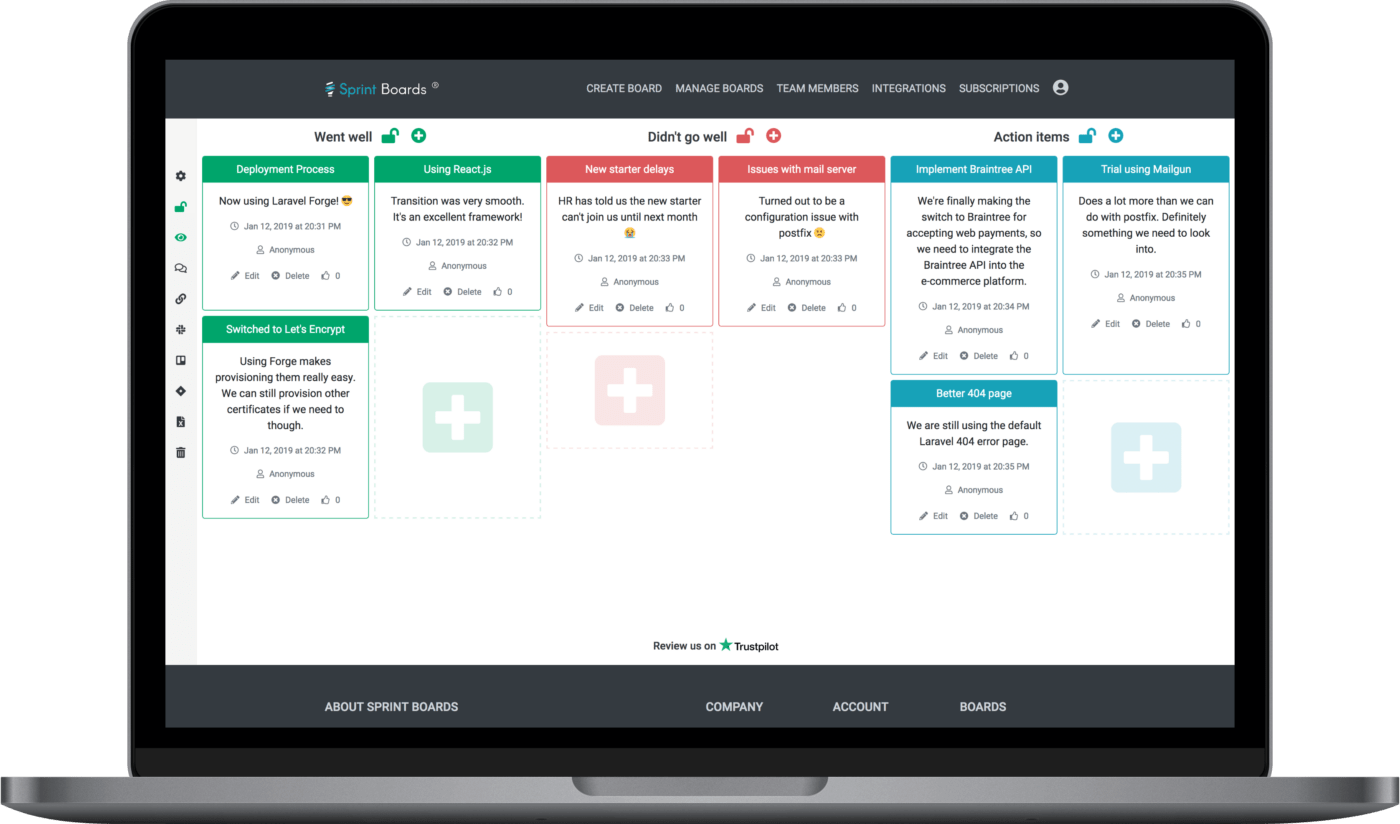
Pros:
Customizable templates, real-time updates, integrations.
Cons:
User interface can be challenging for beginners.
Ratings: 4.5/5
3. Reetro
Reetro is a versatile retrospective tool, purpose-built to enhance team collaboration and simplify feedback collection. Its intuitive interface, combined with robust security measures, positions it as a reliable choice for teams seeking efficiency in retrospectives. However, its lack of advanced features such as AI-powered insights may limit its appeal for those seeking more sophisticated analysis capabilities.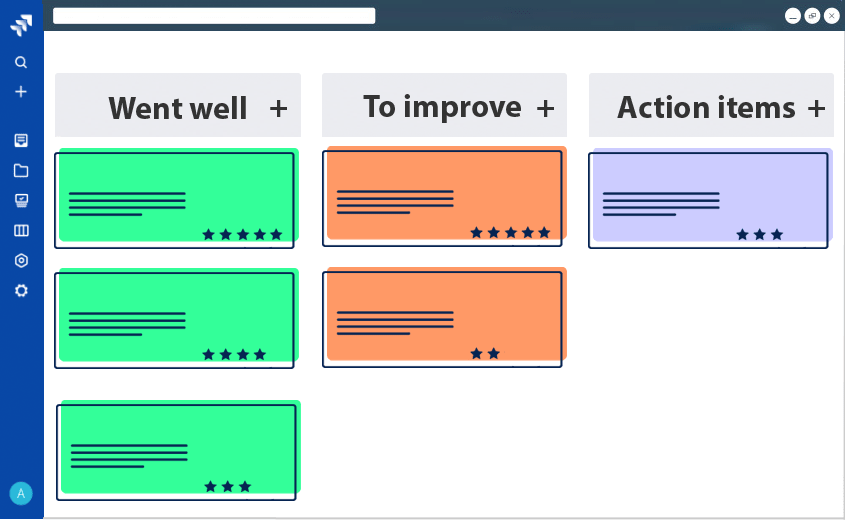
Pros:
User-friendly interface, robust security features.
Cons:
Lacks AI-powered insights.
Ratings: 4/5
4. Metro Retro
Metro Retro is an interactive retrospective tool that fosters effective teamwork by leveraging its engaging visual boards, designed to make retrospectives more dynamic and collaborative. While it may not offer integration capabilities with other tools, its unique features such as real-time collaboration on visually appealing boards set it apart in the market, making it a tool worth considering for your retrospectives. However, one potential drawback of Metro Retro is its lack of customization options. This could potentially limit its adaptability to specific team needs or project requirements. Despite this limitation, Metro Retro's emphasis on creating an engaging and interactive retrospective experience should not be overlooked when exploring options for your team's retrospective process.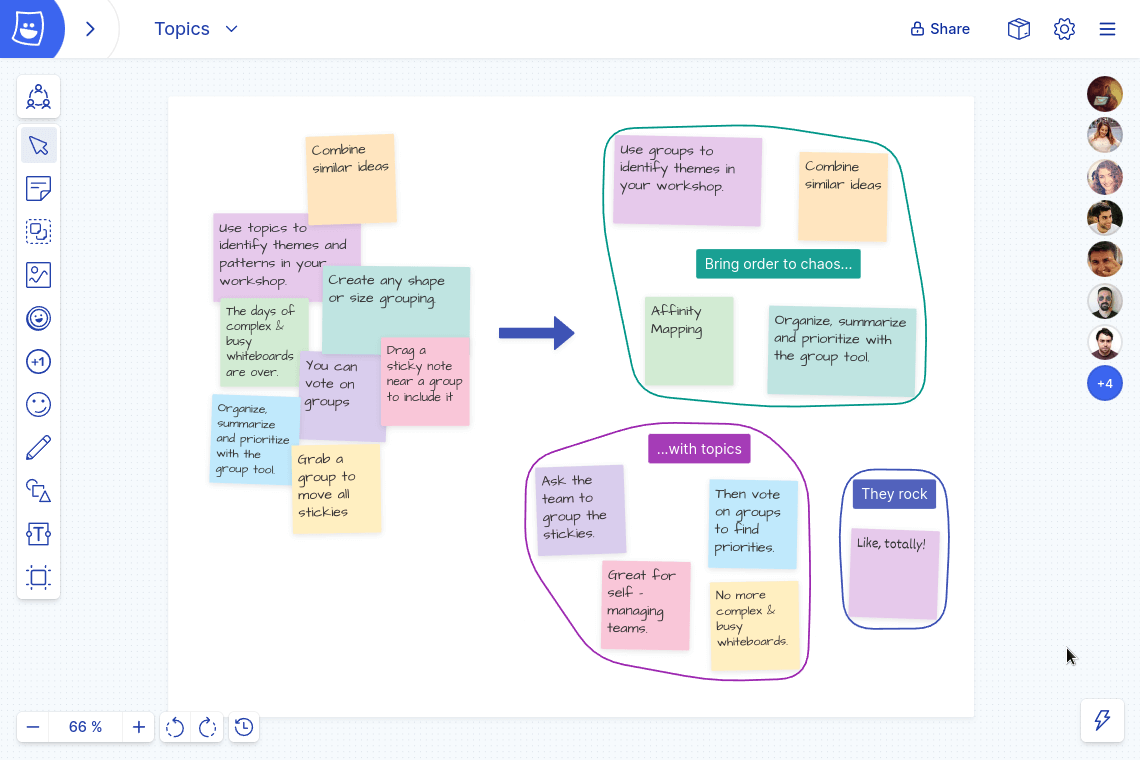
Pros:
Engaging visual boards promote effective teamwork.
Cons:
Lack of integration capabilities and customization options.
Ratings: 3.8/5
5. Teamretro
TeamRetro is a comprehensive retrospective tool that seamlessly blends ease-of-use with potent features such as real-time collaboration, customizable templates, and robust data protection measures. This combination makes it an excellent choice for teams seeking to enhance their retrospectives while maintaining simplicity in their workflows. However, one potential drawback to consider is its scalability. While TeamRetro offers a robust set of features, it may not be ideally suited for larger teams or complex projects due to potential scalability issues.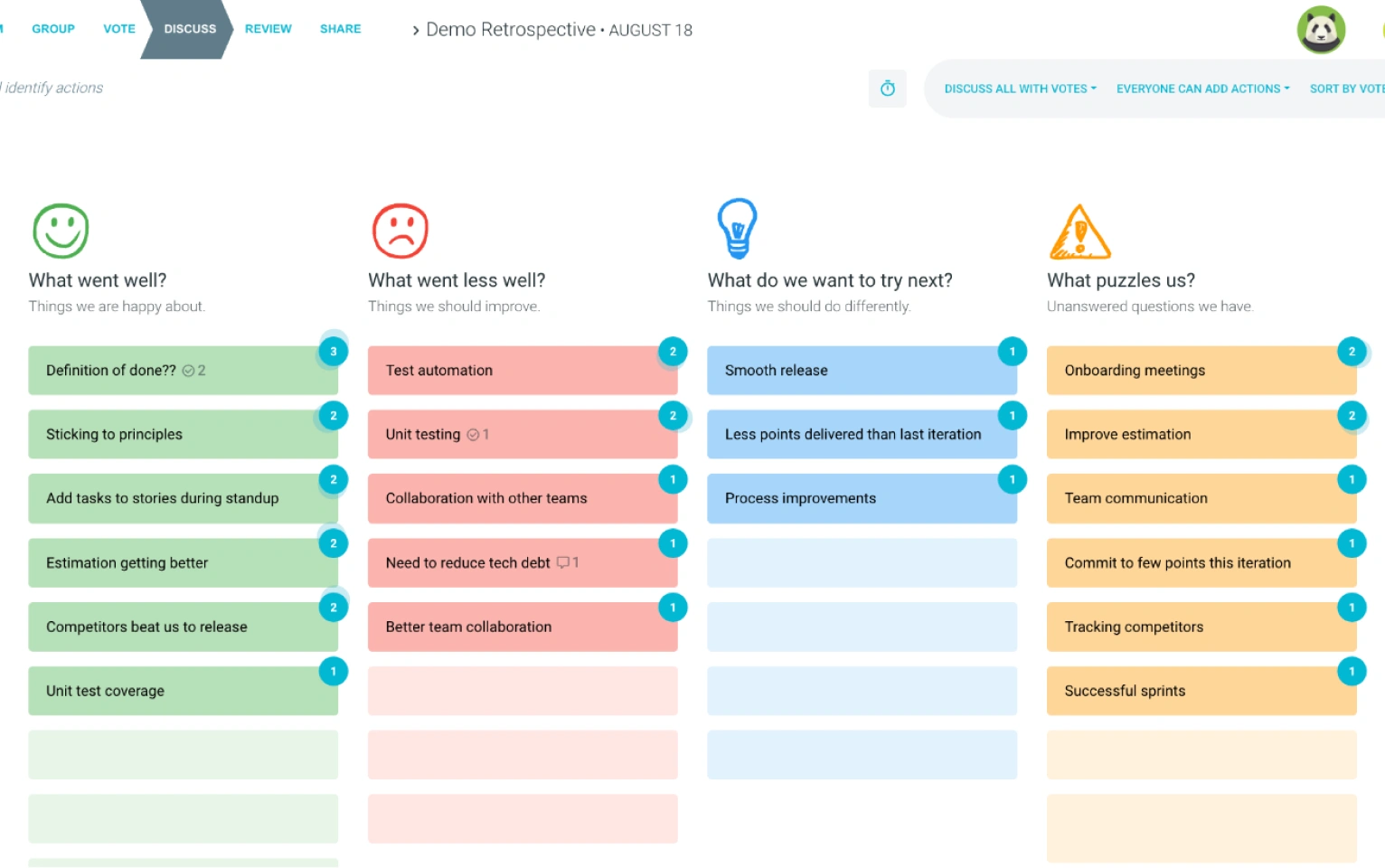
Pros:
Real-time collaboration feature, customizable templates and secure data protection.
Cons:
May not scale well for larger teams.
Ratings: 4/5
6. Echometer
Echometer distinguishes itself in the market with its AI-powered insights, a unique feature that empowers teams to progressively enhance their retrospectives over time. Its intuitive interface, designed with user-friendliness in mind, coupled with robust security measures to protect user data, further contribute to its appeal as a retrospective tool of choice. However, it's worth noting that for non-tech savvy users, there could be a steeper learning curve involved in mastering all of Echometer's features. Despite this potential challenge, the advanced capabilities and insights offered by Echometer make it a compelling option for teams committed to continuous improvement.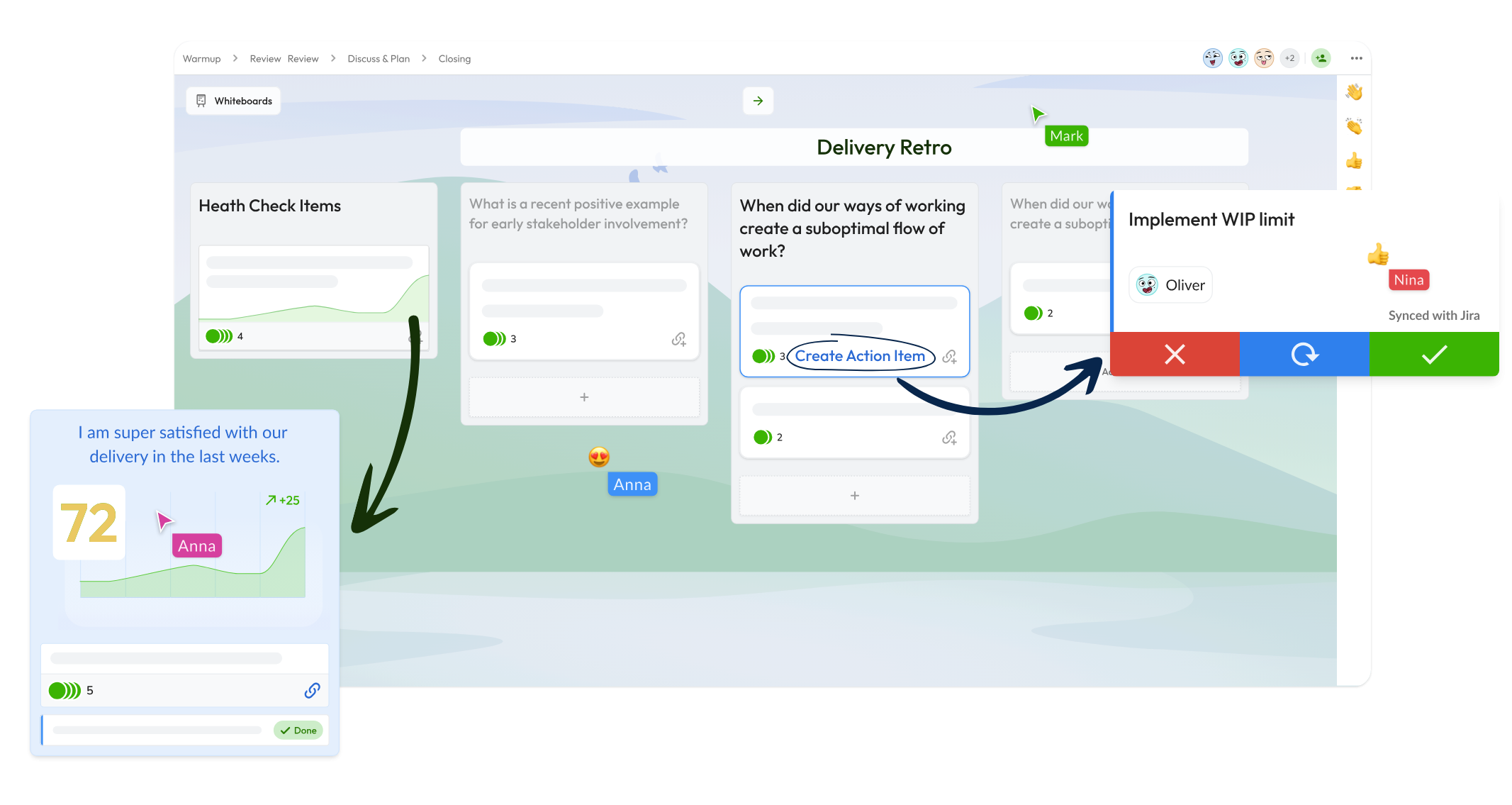
Pros:
AI-powered insights improve retrospectives over time; intuitive interface; robust security measures.
Cons:
Steep learning curve for non-tech savvy users.
Ratings: 4/5
7. Neatro
Neatro provides a straightforward yet potent platform for conducting retrospectives, embodying simplicity and usability in its design. While it may not boast some of the more advanced features such as integration capabilities with other tools, its emphasis on simplicity and user-friendliness makes it an appealing option for smaller teams or those just starting their retrospective journey. However, this lack of advanced features could potentially limit its suitability for larger teams or more complex projects that require a higher degree of collaboration and data sharing. Despite this, Neatro's commitment to creating a user-friendly experience should not be overlooked when considering options for retrospective tools.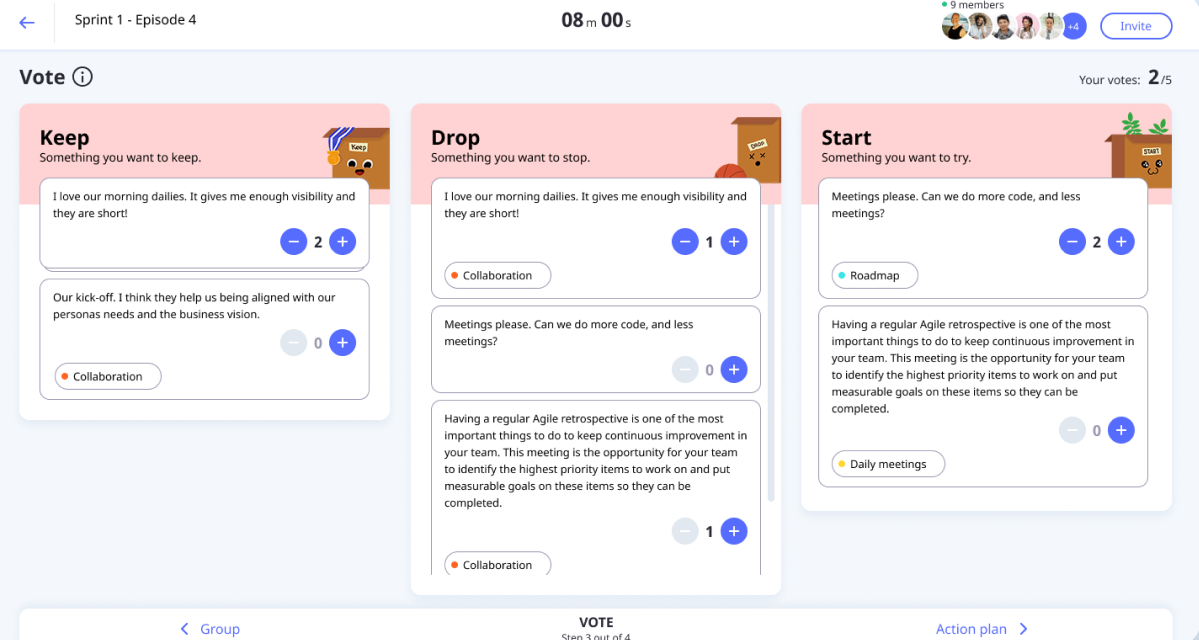
Pros:
Simple platform; focus on usability; good option for smaller teams;
Cons:
Lacks integration capabilities; may not suit complex projects;
Ratings: 3/5
8. goReflect
goReflect is a dedicated online retrospective tool that places a strong emphasis on fostering continuous improvement through regular feedback cycles. Its user-friendly design, coupled with its customizable templates, allows it to be easily adapted to suit any team's unique needs, making retrospectives more efficient and effective. However, one potential limitation of goReflect is its lack of integration capabilities with other project management or communication tools. This could potentially restrict its functionality and may require teams to manually transfer data between platforms, which could impact efficiency. Despite this, goReflect remains a solid choice for teams focusing on continuous improvement and streamlined feedback processes.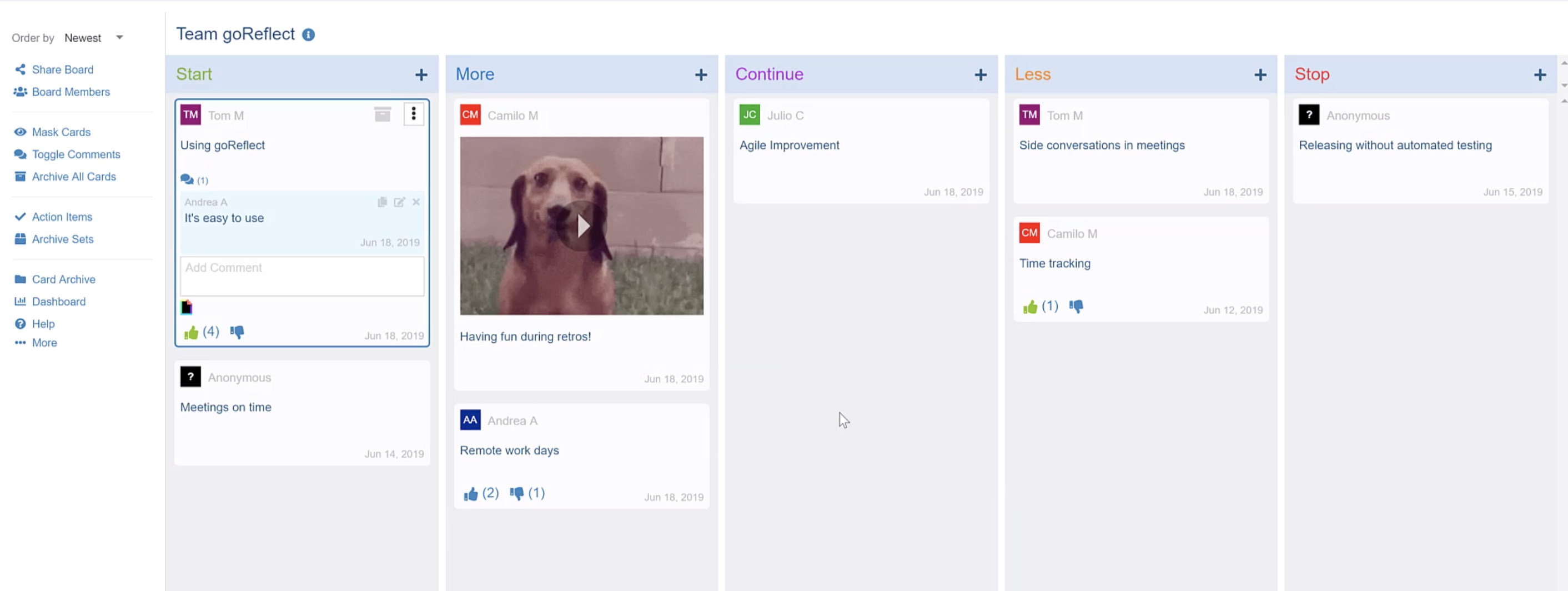
Pros:
Emphasizes continuous improvement; user friendly design; customizable templates
Cons:
Lack of integrations
Ratings: 3/5
9. ScatterSpoke
ScatterSpoke presents a robust and comprehensive platform for conducting retrospectives, equipped with an array of impressive features. These include real-time collaboration that fosters immediate feedback and enhanced teamwork, customizable templates that provide flexibility to cater to various project needs, and data-driven insights that aid in informed decision-making. However, one potential drawback to consider is its pricing structure. Compared to other tools available in the market, ScatterSpoke's cost might be on the higher end of the spectrum. While this could be a deterrent for some, it's important to weigh the advanced capabilities and benefits it offers against its price point.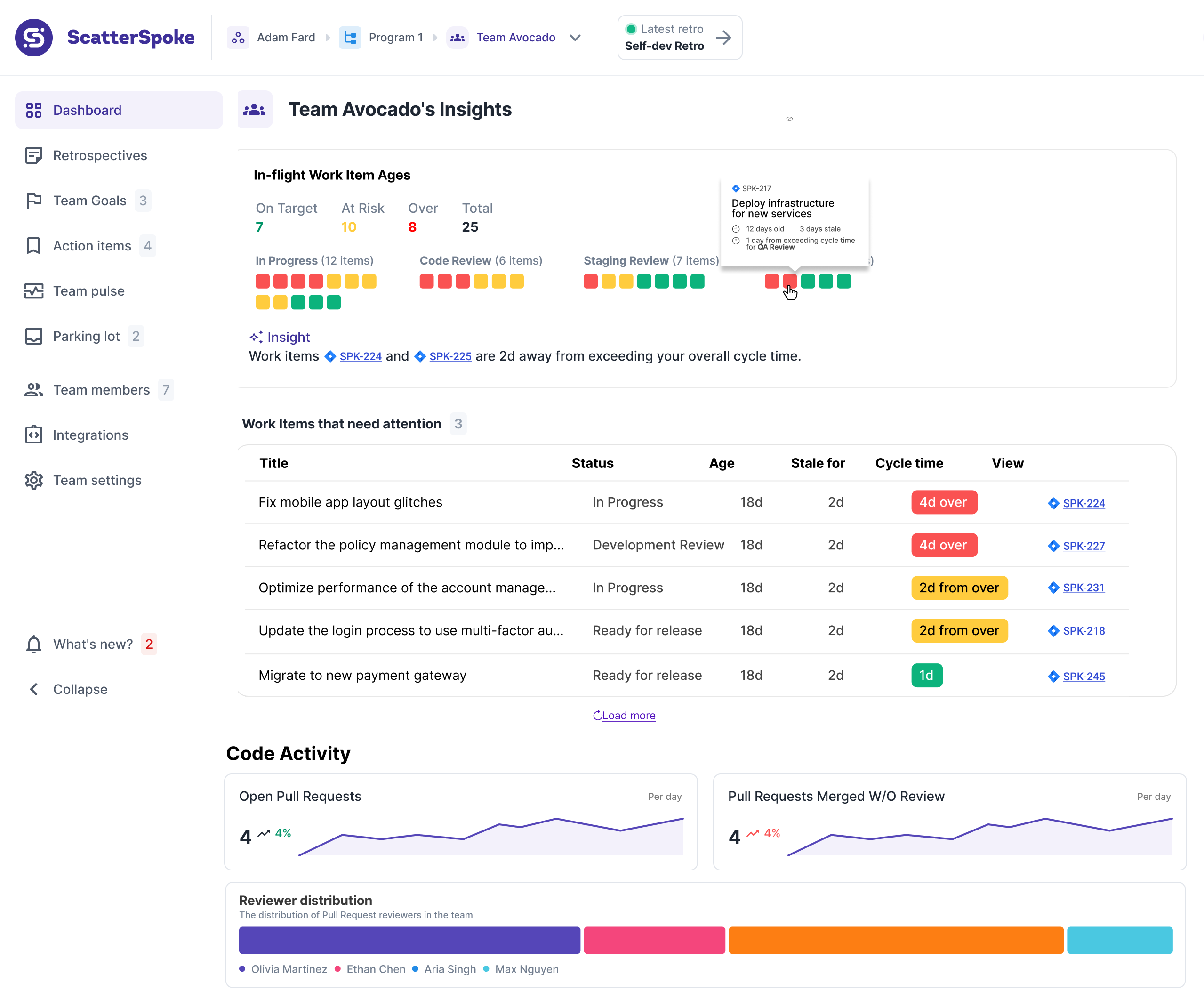
Pros:
Real time collaboration; Customizable templates; Data driven insights
Cons:
High pricing
Ratings: 4/5
10. Retrium
Retrium concludes our list, standing out as a formidable retrospective tool that is recognized for its exhaustive array of features. These include real-time collaboration capabilities, customizable templates that can be tailored to various project needs, and seamless integrations with other tools for streamlined workflows. However, it's worth noting that while Retrium offers these impressive features, the setup process can be somewhat time-consuming. This may require additional patience and time investment initially, but the payoff in terms of enhanced team collaboration and efficiency could well be worth it.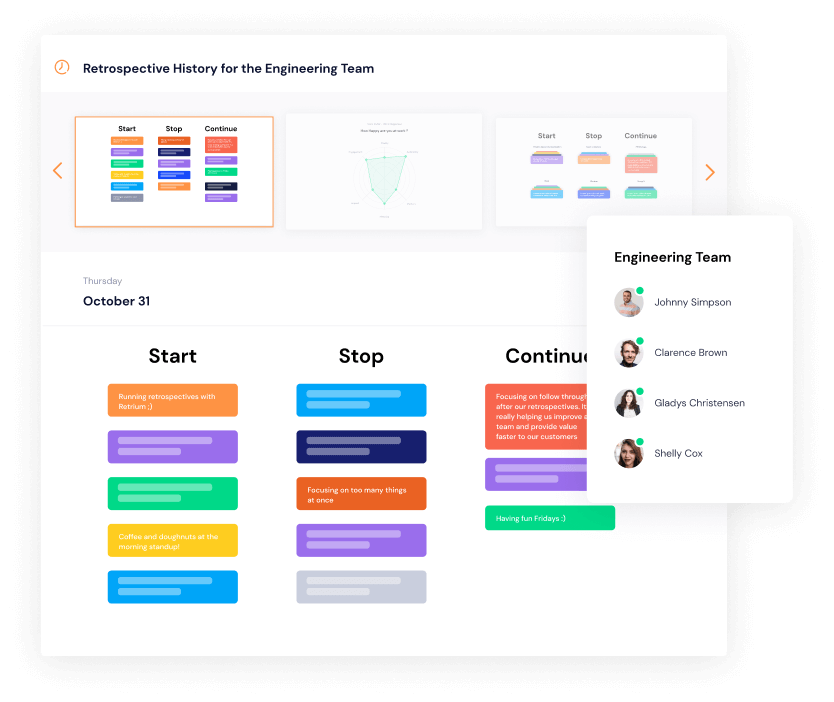
Pros:
Comprehensive feature set; Real time collaboration; Customizable templates; Seamless integrations
Cons:
Time-consuming setup process
Ratings: 4.5/5
Part 4. Which Is the Best Retrospective Tool?
After meticulous evaluation, Boardmix emerges as one of the premier online retrospective tools in the current market, owing to its comprehensive suite of features coupled with its user-friendly design. Its robust capabilities and intuitive interface make it an excellent choice for teams seeking to streamline their retrospectives and enhance collaboration. We wholeheartedly recommend that you explore Boardmix for your team's needs. By doing so, you can personally experience how this innovative tool has the potential to revolutionize your team's collaboration process, fostering a culture of open communication, continuous learning, and improved productivity.






